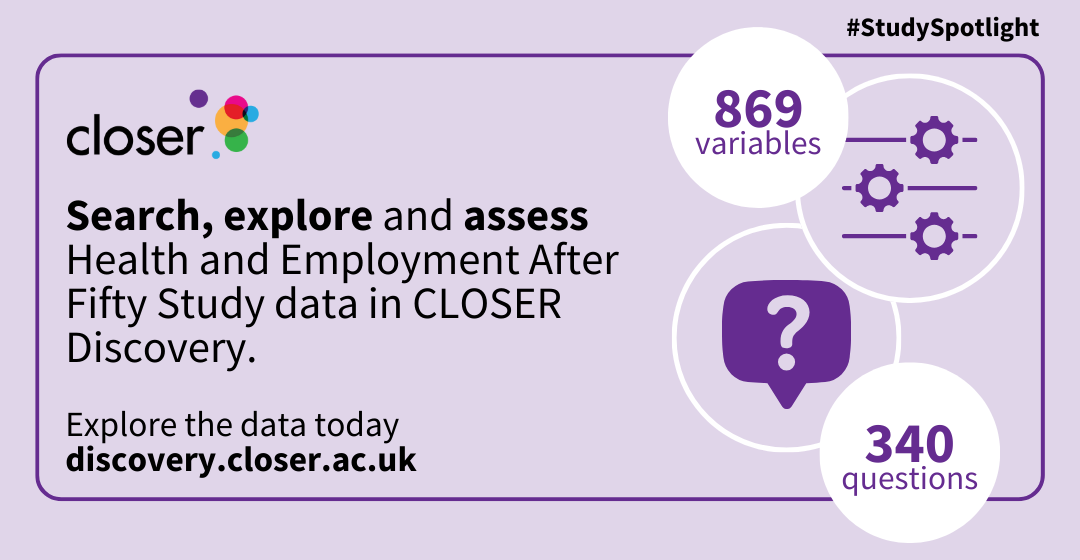 In this Study Spotlight we shine a light on the internationally recognised Health and Employment After Fifty (HEAF) Study.
In this Study Spotlight we shine a light on the internationally recognised Health and Employment After Fifty (HEAF) Study.
About the study
The Health and Employment After Fifty (HEAF) Study aims to assess the health benefits and risks of working at older ages and help understand whether common health conditions could limit work capabilities in later life.
Launched in 2013, HEAF recruited 8,134 men and women aged 50-64 years of age from 24 general practices across England. The study participants represent a range of employment circumstances including employed, self-employed, unemployed, retired, those volunteering, or those caring for someone.
The initial questionnaire collected information on participants’ employment status, physical and psychological health, financial circumstances, retirement plans, as well as leisure and social activities. Since 2013, the study has conducted six further rounds of data collection.
Findings from the study have helped inform the work of several UK government departments including the Department for Work and Pensions and the Department for Health and Social Care. The study has also provided data to Public Health England (now the UK Health Security Agency), the UK government’s Joint Health and Work Unit, and the Centre for Ageing Better.
Recent research has investigated:
- Work and retirement among women
- The impact of menopausal symptoms at work
- Exiting the workforce and risk of loneliness
Discover the data
 If you’re interested in using data from HEAF to carry out your own research, you might be wondering where and how to find out exactly what data has already been collected. That’s where our Discovery research tool can lend a hand.
If you’re interested in using data from HEAF to carry out your own research, you might be wondering where and how to find out exactly what data has already been collected. That’s where our Discovery research tool can lend a hand.
Discovery enables you to search, explore and assess HEAF data in an unprecedented level of detail. A filtered search of the HEAF metadata pulls up detailed information about 340 questions and 869 variables from the study. Research topics covered include employment and income, mental health, physical health, health behaviour, family and social networks, education, and more.
Response to the COVID-19 pandemic
In response to COVID-19 HEAF conducted two special online surveys to track how the participants’ lives had changed both prior to and during the pandemic. The study also conducted in-depth interviews with a sub-sample of study participants to complement the quantitative component of the COVID-19 research.
Longitudinal research using data from the HEAF COVID-19 study found that people in poorer health, as well as women and those who had family or friends affected by the illness, were more likely to refrain from accessing healthcare during lockdown.
Want to find out more? You can use our COVID-19 Research Tracker to access all the briefing notes, reports, academic publications and articles that cite HEAF COVID-19 data.
Scratching the surface
This spotlight is only a whistle-stop tour of HEAF and how you can use the study in your own research into health and employment in older ages. As the study continues, we look forward to seeing what’s next on its horizon and continuing our work with this unique longitudinal population study.
You can keep up to date with all the latest developments on HEAF and the longitudinal research community, sent direct to your inbox, via our monthly newsletter, Longitudinal News.
Further information
This blog is part of our ‘Study Spotlight’ series. This series showcases the CLOSER partner studies, demonstrating how to make the most of these valuable assets through CLOSER’s research resources. Every month, we turn the spotlight on a new theme, producing a series of blogs that delve into the backgrounds of studies that share similar characteristics, such as their study sample, design, or topics of research interest.
‘Study Spotlight’ helps you gain a deeper understanding of the studies in our partnership and how you can better utilise these on your research journey.
Previous Study Spotlight blogs:
- ALSPAC and the millennial generation (April 2023)
- Next Steps and the millennial generation (April 2023)
- ELSA and the ageing population (May 2023)
- Hertfordshire Cohort Study and the ageing population (May 2023)
- MRC NSHD and the ageing population (May 2023)
- MCS and the British birth cohorts (June 2023)
- BCS70 and the British birth cohorts (June 2023)
- NCDS and the British birth cohorts (June 2023)
- Understanding Society: The UK Household Longitudinal Study (July 2023)
- ONS Longitudinal Study (July 2023)
- Back at school with Growing Up in Scotland (September 2023)
- Generation Scotland (October 2023)
- Northern Ireland Cohort for the Longitudinal Study of Ageing (January 2024)
- Born in Bradford – can a research project change a city? (February 2024)
- Longitudinal Study of Young People in England: Cohort 2 (March 2024)
- Southampton Women’s Survey (June 2024)
On Twitter? Follow #StudySpotlight to keep up to date with the series throughout the year.
Related links:
